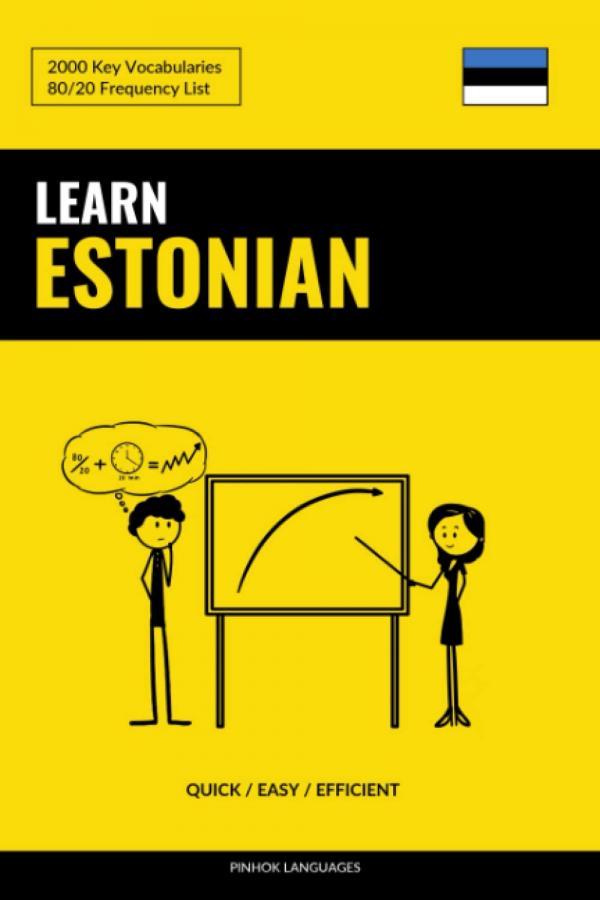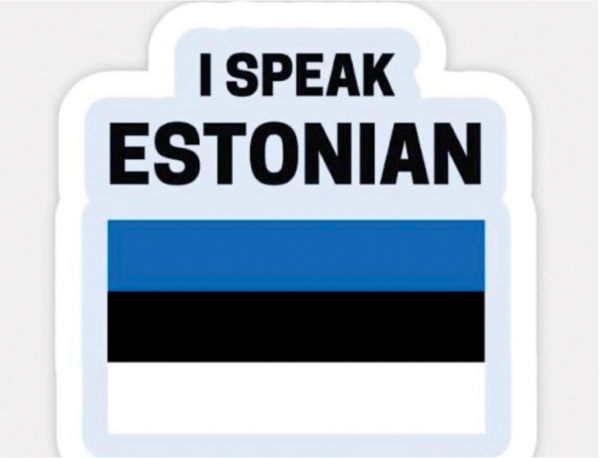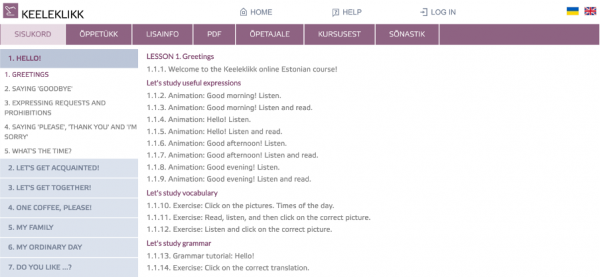This blog post was written by Atanu, a Software Development And Entrepreneurship student at Estonian Entrepreneurship University of Applied Sciences.
Tere, tulevased Eesti IT tudengid! (Hello, future Estonian IT students!)
If you're gearing up to study IT in Estonia, there's likely a question that has crossed your mind: "Do I need to learn the Estonian language alongside my tech-heavy syllabus?”. You might have even heard that there is no need to learn Estonian to be successful at IT. That’s partially true, but not entirely. Let me explain.
Looking Back
A few days ago, I was giving my final touch to my bachelor’s thesis and suddenly it dawned on me that it's been almost three years since I moved to Estonia. During that time, I had completed my part-time job, found and then finished my first software development internship, and finally kickstarted my career as a “Command Line Warrior”. Many among you would agree that the hardest part of a professional career is to start it.
Looking back, I was wondering “If I had the chance, what could I have done better?”.
The very first thing on the list was “Learning Estonian”.

But the revelation was not surprising. I have heard many times on various occasions that IT students don’t need to learn Estonian. All the jobs are in English, and many companies are international. Besides, there is always the option of learning Estonian later.
I experienced that this was not the case at all. In fact, not knowing the Estonian language gives a major disadvantage to the international candidates over the local talents. I along with most of my friends have experienced it.
Every company is becoming an IT company
You might have heard this phrase. It’s true!
Every company needs to have a digital presence to survive in today’s modern economy. This has become an absolute necessity.
As a result, Estonian companies, in most cases, have small dedicated IT teams to take care of their IT infrastructure. I have discussed this detail in the later part of the blog with some examples.
But isn’t English Lingua Franca of IT?
True. But when and how a company was founded and how the team is structured really determines if the IT team will be comfortable in English or not.
There are companies like Kuehne+Nagel, Microsoft, Malwarebytes, and Twilio that are global companies but have their IT branch in Estonia. They almost entirely use English.

But other than those, we can broadly divide companies into two parts. Young and old companies. Young companies (in many cases startups) like Starship Technologies or mature yet growing companies like Wise, Bolt, or Pipedrive.
Then there are small to medium-sized companies, and many large stalwarts, who have been here for decades. One of the great examples is Helmes, renowned for their employee satisfaction.
The young companies, in most cases startups, are built with international expansion in mind. So their official communication language is English from the get-go. And almost all the startups, regardless of industry, use English.
When it comes to SMEs and large companies that have been around for decades, such as Helmes, LHV Pank, and Eesti Energia, they have deeply rooted company cultures built around the Estonian language. These companies have meetings in Estonian, their entire documentation is in Estonian language. So, it’s extremely hard for them to hire someone who doesn’t speak the language.
Teamwork is extremely necessary for any job. But for IT, it’s an absolute since you need to put server fires all the time. Along with that, there are several occasions when you most likely need to talk to other stakeholders, even customers. And to do all that, language is a must-have.
Most of the IT students that I have met so far are relatively new to the field with little to no experience. So, in most cases, employers give the chance to such candidates as a junior or a little bit above that position. Candidates are expected to learn the tech stack while working. In such scenarios, cultural and linguistic fit becomes as crucial as technical proficiency. And remember, Estonian candidates, fluent in both their native languages and also in English, are competing for these very roles with you.
You can find that firsthand on the job listing websites.
There are 3 such websites in Estonia, CV.ee, CVkeskus, and Work In Estonia. Work In Estonia usually lists jobs that are for English speakers. While CV.ee and especially CVkeskus list jobs for Estonian speakers. You can filter with IT and see the requirements of the jobs. In many cases, it would be written that they need Estonian language proficiency.
Short tip, if the ad is in Estonian language, they require Estonian proficiency (even if it's not mentioned).
If you want to see firsthand the culture of the company, you will benefit immensely by visiting a career fair. I have written a blog post "Discovering the Future" about it.
Let’s talk about some examples
The examples I am sharing below come from my personal experience and I believe they will give you a broad understanding of the situation.
A few months ago, I was interviewed by a company named Taxid AS, one of Europe’s top sellers of gold coins. They were looking for a junior DevOps Engineer. The company was founded 30 years ago, just after the independence of Estonia. They have their employees spread all over Europe. And they have grown without taking a single euro of debt. A very traditional, conservative company, focused on long-term growth. Their IT team only consisted of 8 people and was solely located in Estonia.
During the interview, they didn’t ask me a single technical question. They just wanted to understand what drives me. The questions were very simple like “What technologies do you know in DevOps space? Why do you think Linux is better?”. In the end, I asked them: "Why didn’t you have any technical questions for me?" They said that they don’t expect anything from a junior. They just want to figure out how I would fit into the team.
During the interview, the manager asked me twice about my Estonian proficiency. My personal feeling is that the overall impression was good, but the idea that I won't be able to interact with others outside of the IT team became the reason why I was not hired. Which I think is quite understandable.
Telia was another company where I faced similar issue. I didn’t believe it at first because Telia is a multinational company. However, it turned out that many of their departments are fully staffed by Estonians and they have their documentation in Estonian as well.
Helmes is also another great company. If you are in the IT space, the name will definitely come up. I met a recruiter from Helmes at a summer party. She was describing why they prefer candidates who speak at least basic Estonian.
Helmes develops software for their clients. Their big customers are govt agencies and hospitals. These clients only communicate in the Estonian language. You might think as a software engineer, in theory, you don’t really need to talk to the clients. That’s a business analyst's job. But in practice, you need to talk to the client directly in order to fully understand what are their needs. It is much easier to code if you know exactly what features the clients are lacking.
I visited their office a while back and it was an amazing experience. You can check out my experience from the blog post My job shadowing day in Estonia.
These are just some of the examples that I wanted to share with you so you know and understand the ground reality. I hope it helped.
To Learn or Not to Learn?
It’s always a recommendation to learn the local language when coming to a European country. Life just becomes much easier that way. Imagine cracking an inside joke, understanding local music, or even surprising your peers with an unexpected "Kuidas läheb?" (How's it going?). And the joy you’ll see in their eyes when you make an effort? Priceless!

The idea that you don’t need to learn the language at all, is not true from my point of view.
There are a lot of English-speaking companies in Estonia. But still limited compared to all the companies in Estonia.
Also, these companies are very popular and have a very good reputation associated with them. Many of them like Wise or PlayTech are publicly listed. So, competition is extremely high. And in these cases, the demand for junior level positions is very low. They mainly need people with years of experience who can build robust infrastructure.
But the companies where you need Estonian skills, are not just willing to hire for junior level positions but also happily offer above-market salaries.
As mentioned before, the majority of IT students would not have sufficient experience for middle or junior-midlevel positions. Even worse, in many cases, the companies would not even count the experience from your home country. I have heard many such cases.
So, I think not having even the basic language skills puts international students at a significant disadvantage.
And don’t forget your time will be limited. In most cases, it’s expected that you would land a job and apply for a work permit before you finish your studies.
According to the new rules, after two years, work permit holders also need to prove their language proficiency to keep the work permit. So, there is no escape from learning the Estonian language. So, why not start early?!
Do I need to be fluent in Estonian?
Absolutely not!
Depending on your program, the curriculum would include mandatory language courses. From A1.1 to A2.2 if you are studying Bachelor’s and A1.1 to A2.1 for Master's.
These courses, in my experience, are really a great way to learn Estonian and practice your language skills on a regular basis. Actually, in A2.1, you are expected to have a basic conversation. If you would be attentive in the classes and practice Estonian regularly, I think that is more than enough.

The company wouldn’t expect fluent Estonian from you. But if they see that you are showing initiative and could become fluent within another 6 months, they would be very happy to take you in.
So, in practice, you would have 1.5 years to get to a basic level of Estonian. I don’t think that with regular practice, it should be hard. The Estonian language is not easy, but it’s not that hard either. A little practice on a regular basis goes a long way.
If you want to know how to learn Estonian on your own, read "How to learn Estonian on your own".
I have seen most of the students neglect Estonian language modules. Just doing enough to pass the exams. And it’s easy to be negligent. Because most people, including the older population over 50, speak very good English.
In Conclusion
In the end, I would like to say that it might seem like an extra task on your to-do list, but investing time in learning Estonian could be one of the most rewarding decisions you will make during your time here. Only then would you truly start appreciating the richness of Estonian culture.
Happy Learning!
Find out which international degree programmes are available for you in Estonia.
Read more blog posts:
